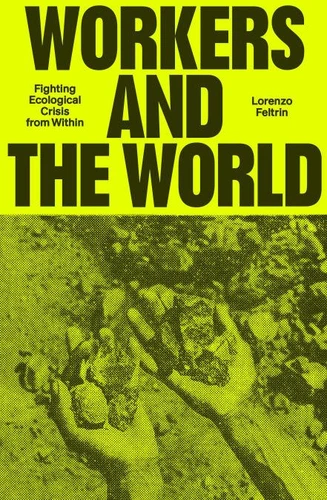Workers and the World. Fighting Ecological Crisis from Within
Par :Formats :
Actuellement indisponible
Cet article est actuellement indisponible, il ne peut pas être commandé sur notre site pour le moment. Nous vous invitons à vous inscrire à l'alerte disponibilité, vous recevrez un e-mail dès que cet ouvrage sera à nouveau disponible.
Disponible dans votre compte client Decitre ou Furet du Nord dès validation de votre commande. Le format ePub protégé est :
- Compatible avec une lecture sur My Vivlio (smartphone, tablette, ordinateur)
- Compatible avec une lecture sur liseuses Vivlio
- Pour les liseuses autres que Vivlio, vous devez utiliser le logiciel Adobe Digital Edition. Non compatible avec la lecture sur les liseuses Kindle, Remarkable et Sony
- Non compatible avec un achat hors France métropolitaine
 , qui est-ce ?
, qui est-ce ?Notre partenaire de plateforme de lecture numérique où vous retrouverez l'ensemble de vos ebooks gratuitement
Pour en savoir plus sur nos ebooks, consultez notre aide en ligne ici
- Nombre de pages240
- FormatePub
- ISBN978-1-80429-784-1
- EAN9781804297841
- Date de parution02/06/2026
- Protection num.Adobe DRM
- Infos supplémentairesepub
- ÉditeurVerso
Résumé
We all need jobs to live, yet capitalist work is destroying the planet. What are the possibilities for convergence between workplace and community struggles?We are in the ecological crisis, and not just as victims of an environmental devastation that is unequally distributed along intersecting hierarchies of class, 'race' and gender. We are part of the crisis because, in our society, the vast majority of us rely on work to pay for the things we need to survive.
This means we also depend on the infinite growth of commodity production that defines capitalism and drives the ecological crisis. Nonetheless, workers' insertion in capital accumulation also has an antagonistic face, rooted in their very separation from the means of production. Therefore, labour is also a crucial collective actor against the ecological crisis. This book explores the relationship between workers and nature by bringing Italian operaismo into a dialogue with a broad range of traditions, from dependency theory to ecofeminism.
Drawing on sustained research in both the Global South - Tunisia and Chile - and the Global North - the UK and Italy - it tackles four timely issues in relation to the ecological crisis: automation and deindustrialisation, employment precarity, imperialism and war, and social reproduction.
This means we also depend on the infinite growth of commodity production that defines capitalism and drives the ecological crisis. Nonetheless, workers' insertion in capital accumulation also has an antagonistic face, rooted in their very separation from the means of production. Therefore, labour is also a crucial collective actor against the ecological crisis. This book explores the relationship between workers and nature by bringing Italian operaismo into a dialogue with a broad range of traditions, from dependency theory to ecofeminism.
Drawing on sustained research in both the Global South - Tunisia and Chile - and the Global North - the UK and Italy - it tackles four timely issues in relation to the ecological crisis: automation and deindustrialisation, employment precarity, imperialism and war, and social reproduction.
We all need jobs to live, yet capitalist work is destroying the planet. What are the possibilities for convergence between workplace and community struggles?We are in the ecological crisis, and not just as victims of an environmental devastation that is unequally distributed along intersecting hierarchies of class, 'race' and gender. We are part of the crisis because, in our society, the vast majority of us rely on work to pay for the things we need to survive.
This means we also depend on the infinite growth of commodity production that defines capitalism and drives the ecological crisis. Nonetheless, workers' insertion in capital accumulation also has an antagonistic face, rooted in their very separation from the means of production. Therefore, labour is also a crucial collective actor against the ecological crisis. This book explores the relationship between workers and nature by bringing Italian operaismo into a dialogue with a broad range of traditions, from dependency theory to ecofeminism.
Drawing on sustained research in both the Global South - Tunisia and Chile - and the Global North - the UK and Italy - it tackles four timely issues in relation to the ecological crisis: automation and deindustrialisation, employment precarity, imperialism and war, and social reproduction.
This means we also depend on the infinite growth of commodity production that defines capitalism and drives the ecological crisis. Nonetheless, workers' insertion in capital accumulation also has an antagonistic face, rooted in their very separation from the means of production. Therefore, labour is also a crucial collective actor against the ecological crisis. This book explores the relationship between workers and nature by bringing Italian operaismo into a dialogue with a broad range of traditions, from dependency theory to ecofeminism.
Drawing on sustained research in both the Global South - Tunisia and Chile - and the Global North - the UK and Italy - it tackles four timely issues in relation to the ecological crisis: automation and deindustrialisation, employment precarity, imperialism and war, and social reproduction.



